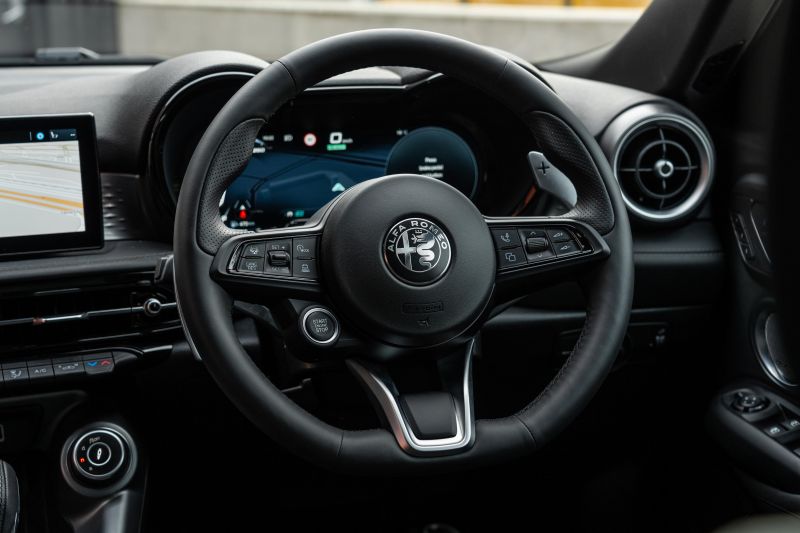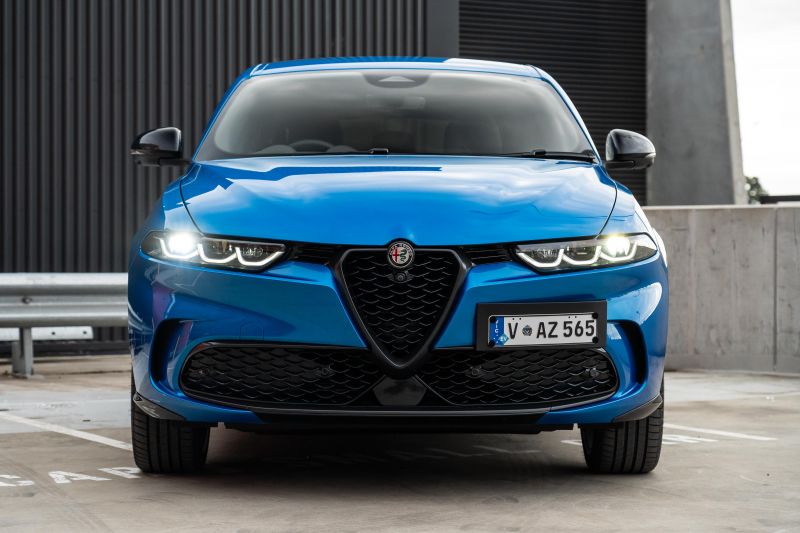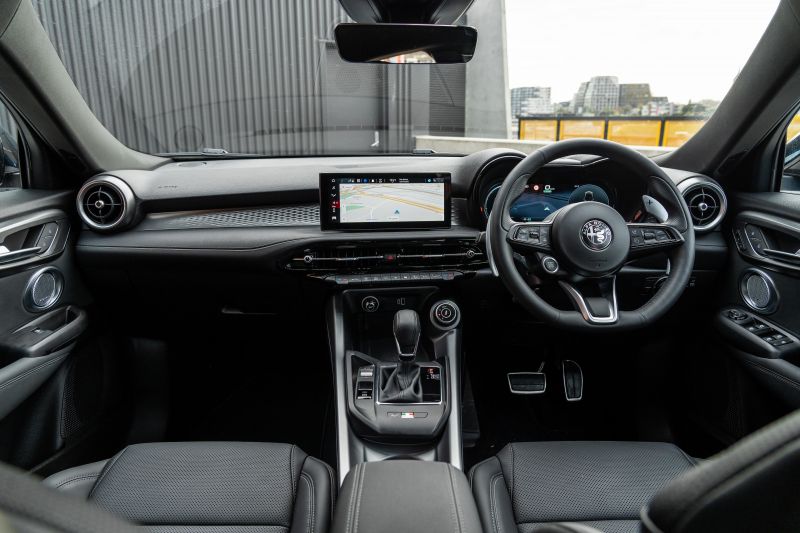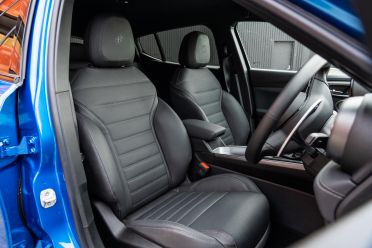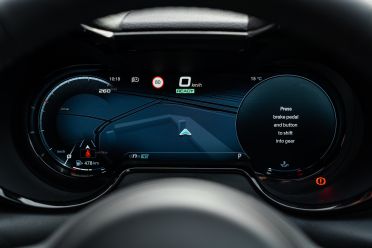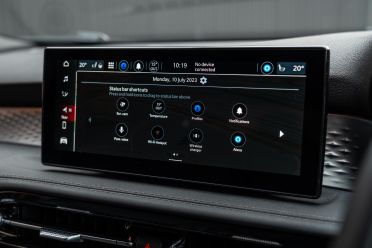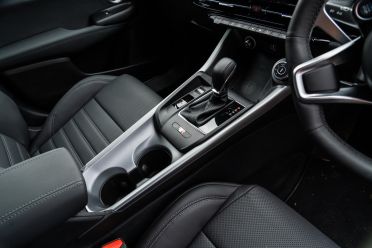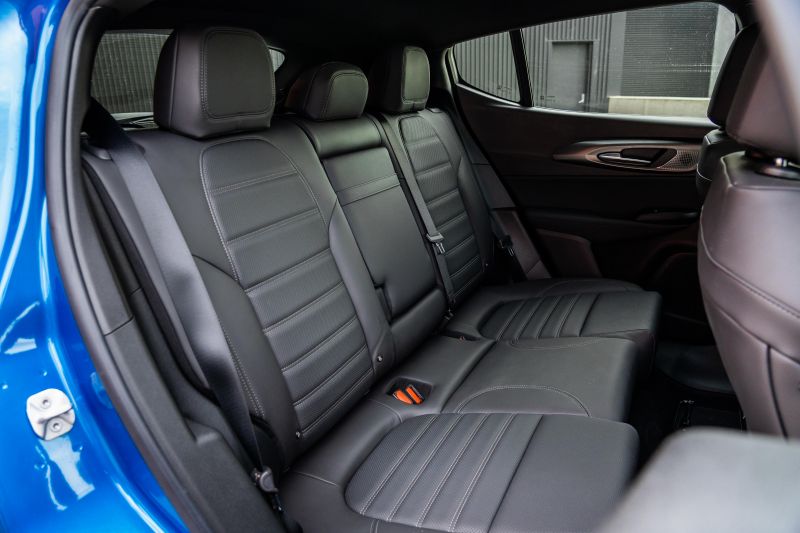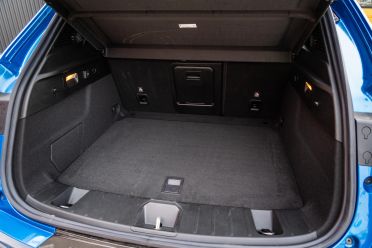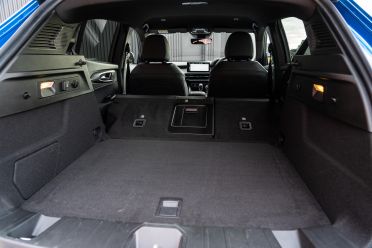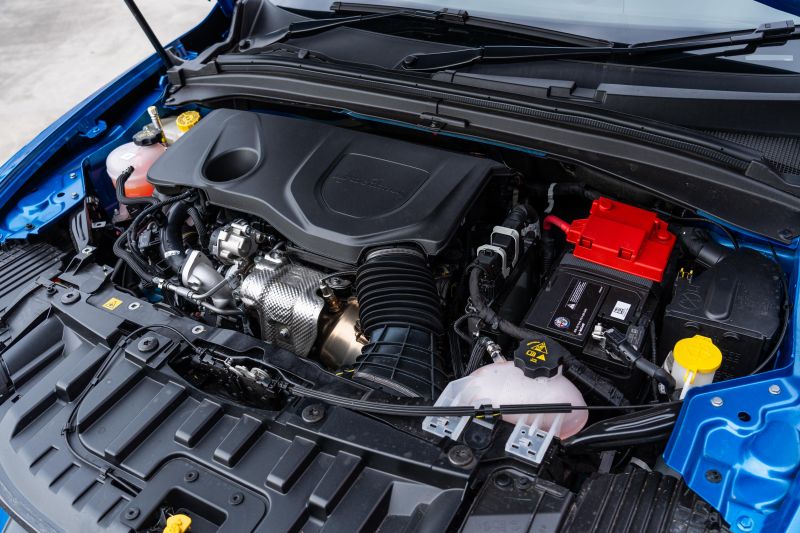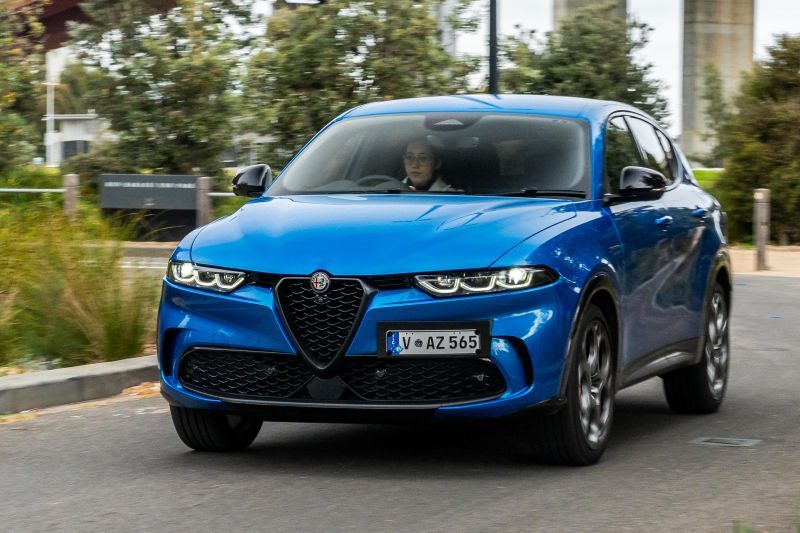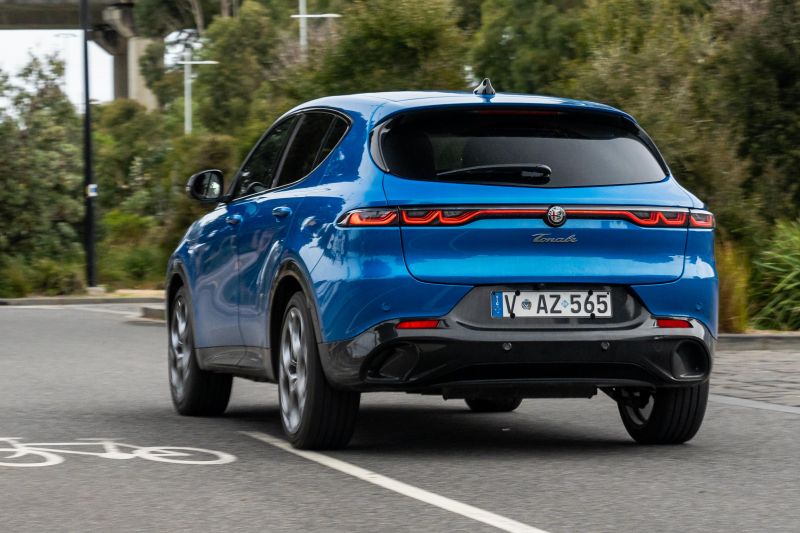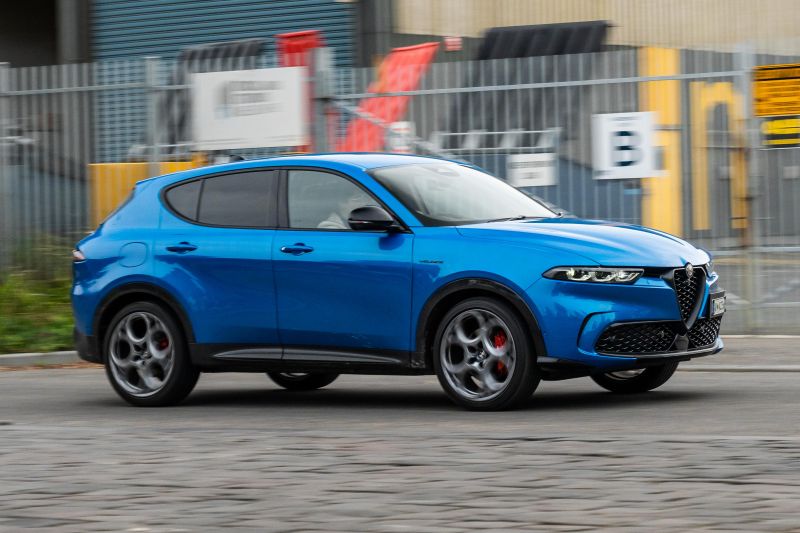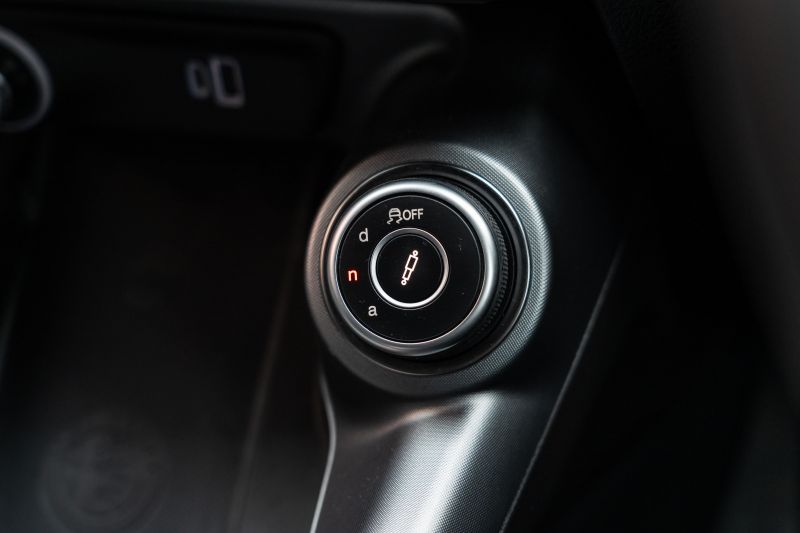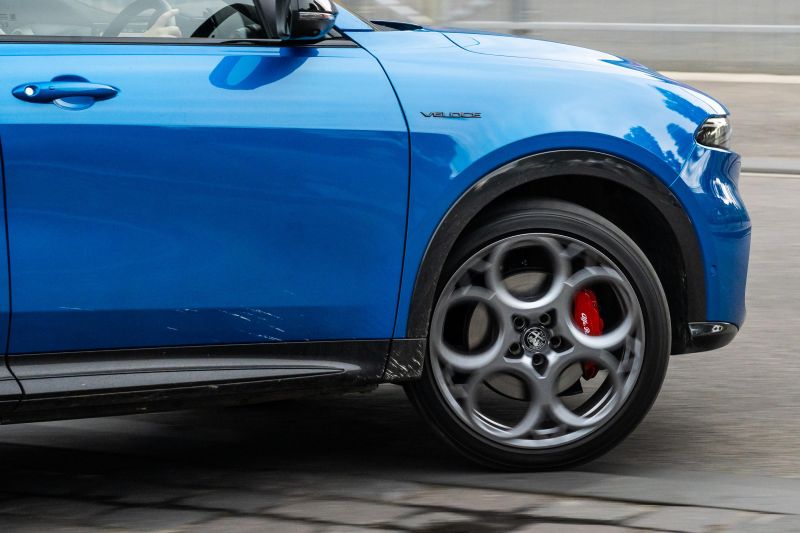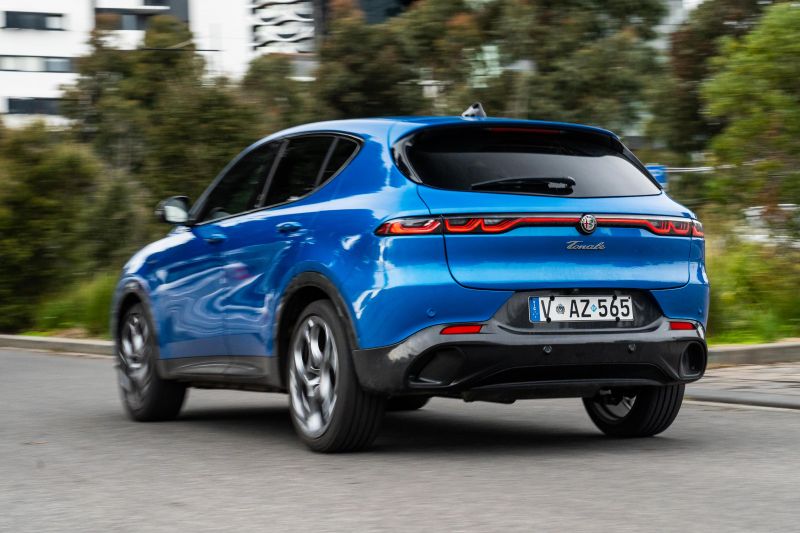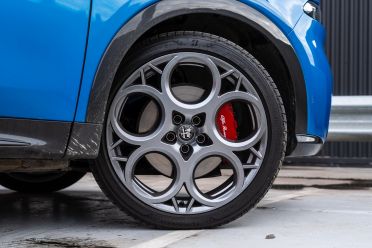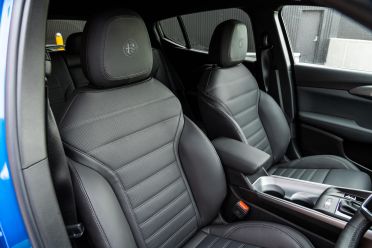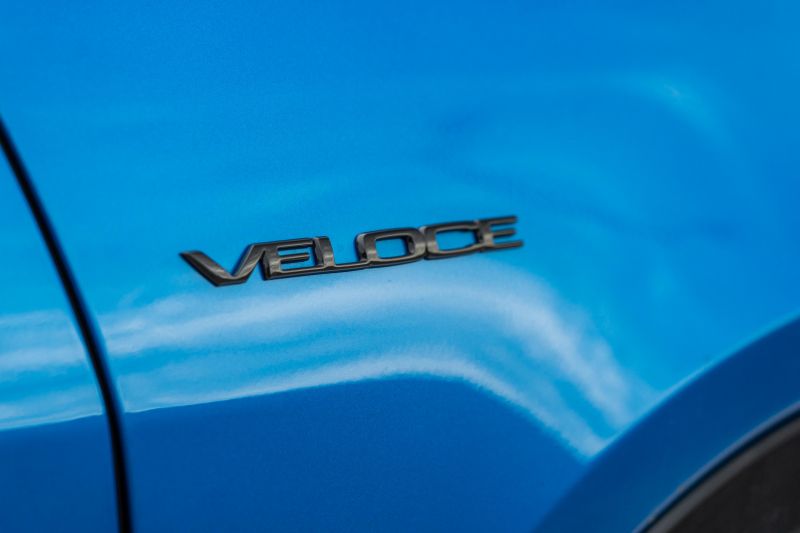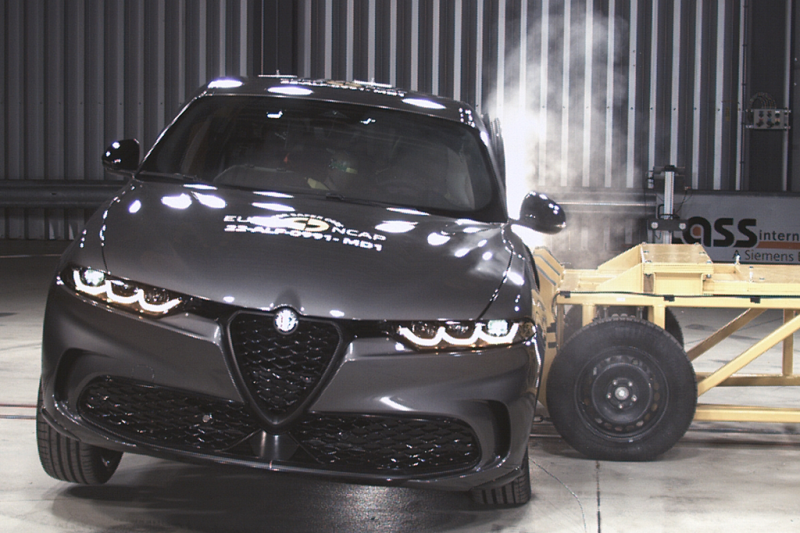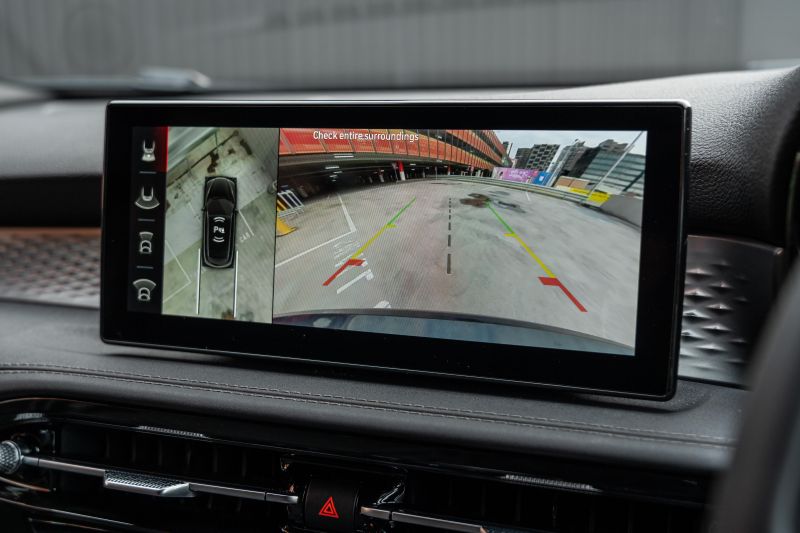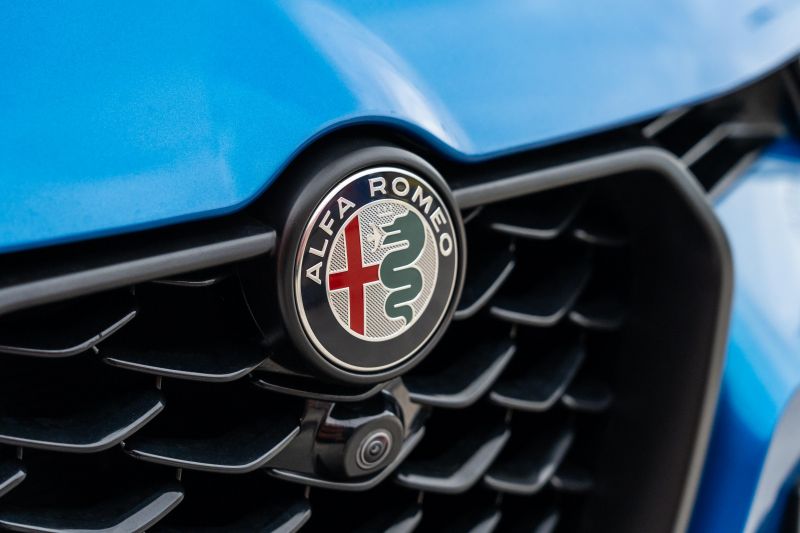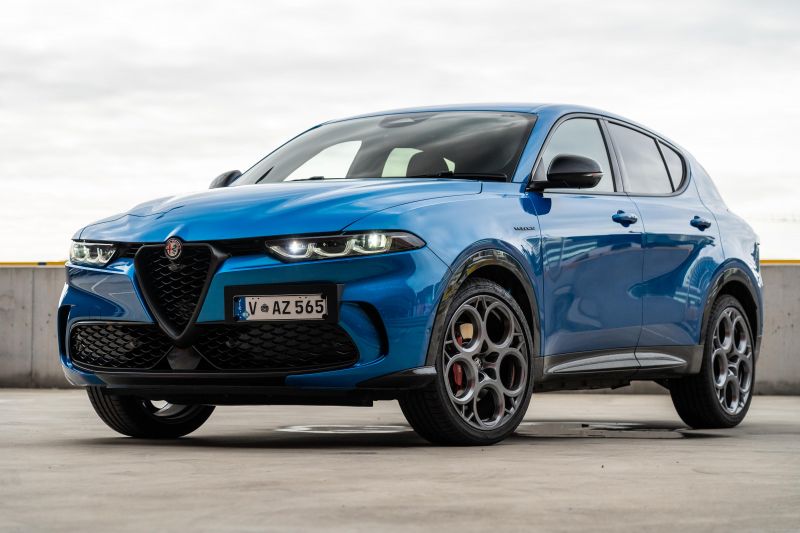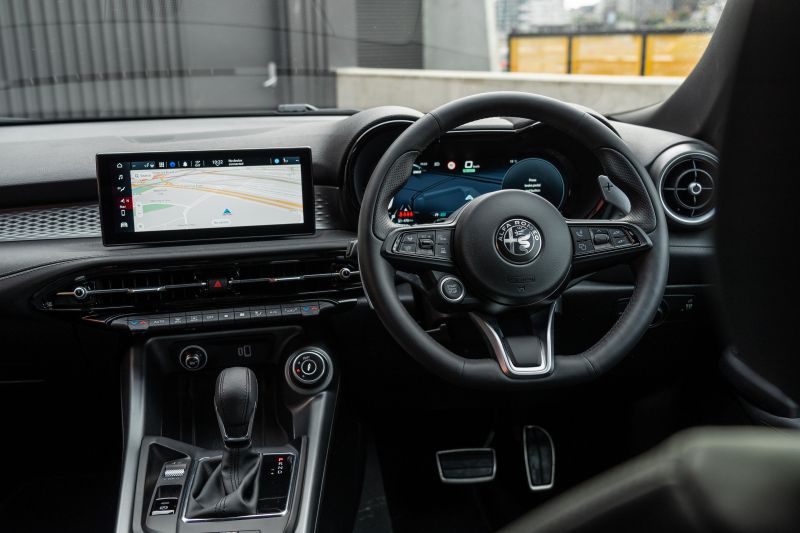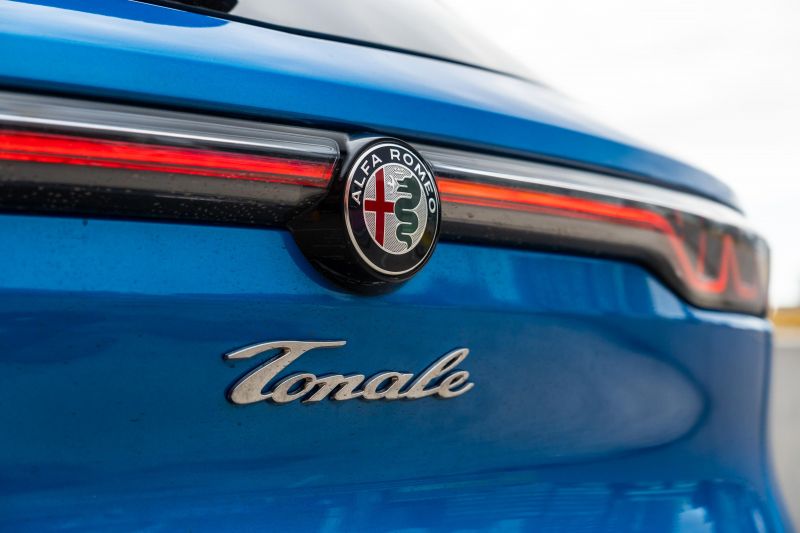This is the car Alfa Romeo needed, if not the car its most hardcore fans wanted.
As much as we love the way they drive, the Giulia and Stelvio haven’t exactly been flying out of Alfa Romeo showrooms. What the brand needed was a crossover with a more accessible price point.
Enter the Tonale, which serves as the brand’s new entry-level model. It’s more expensive than the defunct Giulietta hatchback, but considerably cheaper than the most affordable Giulia and Stelvio.
Unlike those models, it doesn’t ride on a bespoke Alfa Romeo rear/all-wheel drive architecture. Instead, the Tonale is underpinned by a version of the Jeep Compass’ platform.
Alfa Romeo has an exalted reputation that doesn’t seem to translate to strong sales in Australia, and while it’s seen as a premium brand it has offered plenty of vehicles – the Alfasud and MiTo, to name a few – that blur the lines between mass-market and premium.
With the Tonale, it has a sharply priced rival to luxury-brand small SUVs, and can once again boast a base price that could tempt people out of more humble Toyotas and the like.
Does it have the requisite charm to attract people to Alfa Romeo showrooms?
How much does the Alfa Romeo Tonale Hybrid Veloce cost?
The Alfa Romeo Tonale range opens at $49,900 before on-road costs, with the Hybrid Veloce tested here retailing for $56,400 before on-roads and the Plug-in Hybrid Q4 Veloce – appropriately enough, due in the fourth quarter of this year – priced at $77,500 before on-roads.
There’s a range of premium paint finishes if you don’t want boring white. These comprise Alfa Red, Alfa Black, Vesuvio Grey, and our tester’s lovely Misano Blue, with each costing $1600. You can also opt for the stunning Montreal Green, which will set you back $2500.
Sadly, only a black interior is available in Australia – a pity, given there’s an attractive tan option offered overseas.
A panoramic sunroof costs $2500, Veloce-exclusive 20-inch grey-finish alloy wheels cost $1500, and the comprehensive Lusso Pack adds $4500 to the sticker. All our tester was missing was the pano roof, which put its before on-roads price at $62,400.
While the Jeep Compass it shares its underpinnings with is overpriced relative to mass-market rivals, the Tonale stacks up a lot better compared with other luxury-brand competitors.
Even the cheapest BMW X1, the sDrive18i, is priced at $60,400 before on-roads, while a base Mercedes-Benz GLA 200 is priced at $63,200 list.
The Tonale’s price tag does, however, put it up against the mid-range Audi Q3 40 TFSI quattro ($58,400), which includes all-wheel drive. It’s also undercut by the base-grade but more powerful Volvo XC40 Plus B4 ($53,490) and Lexus UX250h Luxury ($54,320).
Then there’s a raft of SUVs from mass-market brands which stack up extremely well against the Tonale, like the Cupra Formentor VZ ($56,990) and Mazda CX-5 G35 Akera AWD ($54,600).
What is the Alfa Romeo Tonale Hybrid Veloce like on the inside?
The Tonale has an interior that’s at once instantly recognisable as belonging to an Alfa Romeo, while also proving fairly user-friendly.
The prominent humps over the digital instrument cluster, stitching details, and round air vents all lend a level of distinctiveness and elegance to the cabin.
Alfa Romeo makes the best paddle shifters of any vehicle under $100,000, and they’re pure industrial art. You need only tap them to discover they’re actually metal, and this sound belongs in an ASMR video.
While we only get a black interior here, distinctively patterned metal-look trim provides some contrast and separates the pebbly soft-touch trim of the dash top from the leather-look trim further down. And while there’s no colour-adjustable ambient lighting, there’s elegant backlighting for the footwells, door handles and pockets.
Is the cabin nice? Yes. Is the material quality noticeably better than, say, a Mazda CX-5? No, and in some aspects the mass-market SUV is nicer inside – the Tonale, for example, doesn’t have leatherette padding on the sides of its centre console.
Build quality appeared solid in our tester, apart from a slight rattle in the B-pillar on both sides of the vehicle across unsealed roads. There’s an acceptable amount of physical switchgear, including redundant buttons for the climate control and an easily accessible drive mode selector.
There are some odd elements, though. Why is there a slide wheel for skipping tracks, but individual buttons for volume control? Also, the rubber wheel selector for the cruise control reminds me of the one in my Hyundai Genesis, and seems almost certain to degrade with time.
We also wish there were actual switches for the heated/ventilated seats and heated steering wheel, which don’t remember your settings and must be activated via the touchscreen each time. On a couple of occasions, I also accidentally changed the air-conditioning temperature while adjusting the heated seats.
Fortunately, the Uconnect 5 infotainment system is generally laid out in an intuitive manner – just ignore the heated steering wheel control being on the passenger side – and features Alfa-specific graphics.
There are shortcut buttons always present on the sides of the screen, even if you have smartphone mirroring active, which allows you to jump between different applications.
There’s also a configurable shortcuts menu, allowing you to add functions like the surround-view camera as a shortcut – though that’s another thing we wish there was a button for. The camera view has somewhat laggy frame rates and can appear washed out a bit by light, but it’s far from low-res.
There’s no head-up display, but there is a lovely 12.3-inch digital instrument cluster that offers a choice between an analogue instrument view, another instrument configuration, and a full-screen map view. Said map graphics aren’t as detailed as Audi’s, but we commend Alfa Romeo for including such a display nonetheless.
There are USB-A and USB-C outlets in the front and in the rear, while up front there’s also a 12V outlet and a wireless charging pad. The latter can be somewhat awkward to access if you have a larger phone.
The air-conditioning is adequate, no more. I’d love to try the Tonale again in the Brisbane summer to see how it copes with the heat.
There are rear air vents, while second-row space is quite good overall. The floor is relatively flat, with the driveline hump being quite low and wide.
Passengers commented on the amount of space in every direction, more than enough for those 180cm tall sitting behind similarly sized drivers, while the seat base was also praised for offering good thigh support.
That echoes feedback about the front seats which, while firm, prove supportive.
Both front and rear, there are bottle holders that can fit 1L bottles. In the rear, there’s a fold-down centre armrest with two cupholders.
Open the tailgate and you’ll find a boot with a claimed 500L of space, under the floor of which sits a space-saver spare. The rear seats fold flat and luggage space expands to 1550L.
What’s under the bonnet?
The Tonale Hybrid is powered by a 1.5-litre turbocharged four-cylinder petrol engine, mated with a seven-speed dual-clutch automatic transmission and augmented by a 48V mild-hybrid system incorporating a small electric motor and 0.8kWh lithium-ion battery pack.
The electric motor can provide additional torque, recover kinetic energy from braking, and even allow the car to be driven in electric-only mode.
Outputs are rated at 118kW (5750rpm) and 240Nm (1500rpm) for the petrol engine, while the e-motor is rated at 15kW and 55Nm.
The Tonale Veloce is front-wheel drive. If you want all-paw traction, you’ll need to wait for the upcoming plug-in hybrid. Alfa Romeo claims the Tonale Hybrid can accelerate from 0-100km/h in 8.8 seconds.
Its outputs aren’t extraordinary. Even the base Volvo XC40 produces 145kW and 300Nm, while the Audi Q3 40 TFSI produces 132kW and 320Nm and a Lexus UX250h produces 135kW.
How does the Alfa Romeo Tonale Hybrid Veloce drive?
You might think using the same underpinnings as the Compass would be a liability, but the chassis is the least of our problems with the Jeep. It’s actually a decent steer, but it’s let down by its powertrain – slow, thirsty, and with a transmission that needs polish.
So what has Alfa Romeo done? It’s substituted one mediocre powertrain for another.
First, the good: the Tonale’s turbocharged four is thrifty. We averaged 6.6L/100km on a loop comprising a mix of inner-city, suburban and highway driving, and this only increased to 6.7L/100km over the course of several days with the Alfa.
The Tonale’s official combined cycle claim is 5.6L/100km, and like many of its rivals it requires 95 RON premium unleaded fuel. It’s definitely not thirsty.
Once up and rolling, the Tonale exhibits decent mid-range grunt so overtaking on the highway isn’t daunting.
It also has a fairly sporty engine note that avoids being too intrusive – Alfa Romeo knows how to make a four-cylinder engine sound good.
That’s the good news. Here’s the bad: this powertrain needs serious recalibration.
At low speeds, the engaging and disengaging of the two clutches is all too noticeable, and it feels rough and jerky – particularly when you are downshifting from second to first.
Usually, the trade-off with poor low-speed refinement in vehicles with dual-clutch automatics is that shifts are snappy when you’re up and moving. Indeed, they’re quick in the Tonale, but they don’t feel all that quicker than a good torque-converter automatic.
The Tonale is also extremely sluggish off the line, despite peak torque being available at just 1500rpm. It feels like you need to overcome a hurdle just to accelerate.
Whether it was because the car was being worn in or I was being worn down, I seemed to get used to the car over the course of a week. Nevertheless, my initial reaction was to question if something was wrong with the vehicle.
Commendably for what is technically a ‘mild-hybrid’, the Tonale can actually run on electric power – we observed it doing so at speeds of almost 20km/h. Some of the transitions could have been smoother, however – especially odd was hearing the petrol engine cut out halfway through a reversing manoeuvre.
There’s a punchier turbocharged 2.0-litre four-cylinder engine available overseas but, much like the turbo 2.0-litre Compass, it’s off-limits to Australia. We’re getting a plug-in hybrid later this year, but it carries a significant price premium.
You can flip the Tonale to sport mode, which improves its responsiveness, but it holds onto gears for longer than is ideal in day-to-day driving.
Sport mode also fails to improve the steering. There’s little discernible difference in weighting, and it still feels somewhat light and disconnected. It lightens up especially noticeably during low-speed cornering, which is handy if you’re turning into a parking spot but odd when you’re rounding a tight corner.
It’s a shame the steering is the way it is, as the Tonale can tackle a winding road without feeling out of its depth. Grip is good and body roll is well-controlled and, while it doesn’t feel as hunkered down and car-like as a Cupra Formentor, it’s poised.
Body control is good, with the Tonale never feeling floaty. Indeed, the Tonale’s ride quality is best described as firm. It doesn’t crash over bumps, even with the sport damper setting selected, but over some rougher road surfaces it can feel a tad fidgety.
Overall, however, we’d call it comfortable. We also appreciate that you can toggle between two levels of damping in sport mode.
There’s a little bit of tyre roar and some faint turbo whistle, but the cabin is appropriately refined for an SUV at this price point.
The Tonale combines the adaptive cruise control with a lane centring function for Level 2 autonomous driving, and it works well for the most part. It can make the steering feel a bit vacant at times, but it keeps the vehicle centred and moving in the direction of the lane.
The traffic sign recognition isn’t as clever, and on a few occasions detected a speed limit of 50km/h. One small hitch: I was driving on a highway. Alfa Romeo is far from the only company to have an occasionally buggy traffic sign recognition system, however.
If you want to change the vehicle’s cruise control speed to a detected speed, you can do so with a single button press. There are also both cruise control and speed limiter functions.
The Matrix LED headlights work marvellously, being bright and yet avoiding dazzling oncoming traffic, while there are also cornering lights. We also appreciate the presence of an auto hold function that will default to on if you activate it.
What do you get?
The Veloce is the flagship Tonale for now, until the plug-in hybrid arrives later this year.
Tonale Ti highlights:
- 18-inch alloy wheels
- Tyre pressure monitoring
- Matrix LED headlights
- Adaptive Driving Beam
- Dynamic indicators
- Automatic high-beam
- Power-folding heated exterior mirrors
- 12.3-inch digital instrument cluster
- 10.25-inch touchscreen infotainment system
- Wireless Apple CarPlay, Android Auto
- DAB radio
- My Alfa Connect services
- 6-speaker sound system
- Wireless charging pad
- USB-A + USB-C ports front, rear
- Keyless entry and start
- Dual-zone climate control
- Electric park brake with auto hold
- 6-way manually adjustable front seats
- Power driver lumbar support
- Carbon cloth/leatherette upholstery, beige stitching
- Leather-wrapped steering wheel
- Aluminium pedals
You also get a three-year subscription to Alfa Connected Services, which allows you to use an app to check the vehicle’s status and perform functions like locking or unlocking the vehicle.
Over this, the Veloce adds:
- Dark Miron body kit with matte inserts
- Privacy glass
- 19-inch alloy wheels
- Brembo red brake calipers
- Gloss black window trim
- Auto-dimming exterior mirrors
- Active Dual Stage Valve Suspension
- Alcantara, leatherette upholstery with red stitching
- Aluminium door sills
- Aluminium paddle shifters
There are still options to be had, however.
The $4500 Lusso Pack, as fitted to our tester, adds:
- Heated, ventilated front seats
- Heated steering wheel
- Heated washer nozzle
- Black leather upholstery with dark grey stitching
- 8-way power front seats incl. driver memory
- 14-speaker 465W Harmon Kardon sound system
You can also add 20-inch alloy wheels for $1500 and a panoramic sunroof for $2500.
Power-adjustable front seats should frankly be standard on the Tonale Veloce, given they are on a Q3 40 TFSI or a base XC40.
Alfa Romeo isn’t alone in sequestering desirable features in an option package, and at least the Tonale Veloce offers a full suite of safety equipment (more on that below) as standard – mind you, the Germans are finally having the sense to do the same, so this is becoming less of a bragging right in 2023.
The Italian brand can brag about offering the option of ventilated front seats, given this is still a rare feature in this segment. Nevertheless, this is still an option, while it’s standard in a Jeep Compass S-Limited.
Is the Alfa Romeo Tonale Hybrid Veloce safe?
The Tonale wears a five-star ANCAP safety rating, based on testing conducted by Euro NCAP in 2022.
This rating applies to all Tonale models at launch, with category scores of 84 per cent for adult occupant protection, 87 per cent for child occupant protection, 67 per cent for vulnerable road user protection, and 85 per cent for safety assist.
Standard safety equipment includes:
- 6 airbags
- Adaptive cruise control incl. stop & go
- AEB incl. Pedestrian, Cyclist detection
- Intelligent speed assist
- Lane keep assist
- Parking sensors front, rear
- Reversing camera
- Traffic sign recognition
Tonale Veloce adds:
- Blind-spot monitoring
- Rear cross-traffic alert
- Side parking sensors
- Surround-view camera
- Level 2 autonomous driving
- Lane centring assist
- Traffic Jam Assist
How much does the Alfa Romeo Tonale Hybrid Veloce cost to run?
As of last year, Alfa Romeo finally offers a five-year, unlimited-kilometre warranty.
The Italian marque also includes five years of roadside assistance and five years of capped-price servicing. Scheduled maintenance for the Tonale is required every 12 months or 15,000 kilometres – whichever comes first.
The first five services are capped at $545, $645, $545, $1345 and $595, respectively. That adds up to $3675 over five years, undercutting the GLA ($4500) but costing more than a Q3 ($3330) or X1 ($2150).
CarExpert’s Take on the Alfa Romeo Tonale Hybrid Veloce
Alfa Romeo CEO Jean-Philippe Imparato reportedly delayed the Tonale’s launch to get it right, specifically the plug-in hybrid version.
We haven’t driven the PHEV on local roads yet, but perhaps it has benefited from this long gestation period. The 1.5T, in contrast, doesn’t seem to have.
While the Tonale stacks up well on price and equipment compared with its fellow premium brand competitors, it struggles to make a case for itself over, for example, a top-spec Mazda CX-5 or a Cupra Formentor.
It’s lacking the brio expected of an Alfa Romeo. The handling is balanced and the engine sounds good, but the steering needs more feel or at least more weight. The powertrain is also sluggish and awkward off the line. It’s an Alfa Romeo, and we expect dynamics towards the top of the class and unfortunately the Tonale doesn’t deliver.
The interior is quite nice but – delectable paddle shifters aside – it doesn’t stand head and shoulders above some SUVs from mass-market brands.
Therein lies the rub. The Tonale exists in an awkward spot where it can’t promise the unique Alfa Romeo experience of a Giulia, and yet doesn’t feel especially more special than a top-spec mass-market SUV. In some respects, it’s actually worse.
I’d love to see Alfa Romeo storm up the sales charts. It’s a storied brand that has put out some great products over the years. With some tweaks, perhaps the Tonale could be one of them.
Click the images for the full gallery

